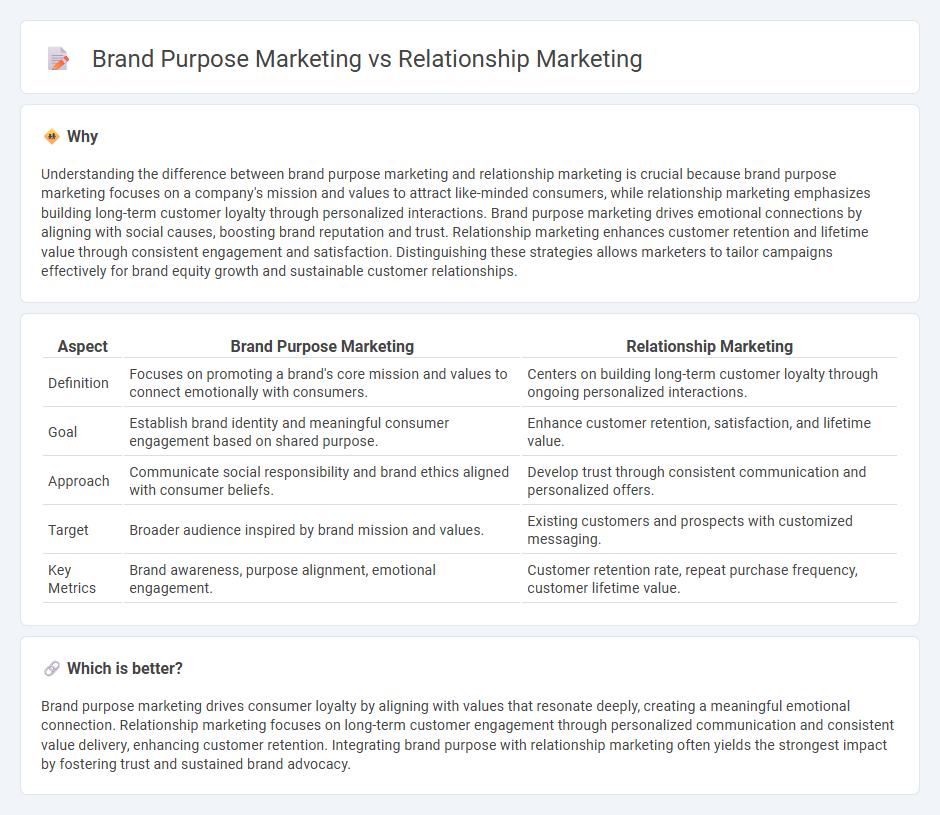
Brand purpose marketing focuses on communicating a company's core values and social impact to resonate with consumers seeking authenticity and meaningful connections. Relationship marketing emphasizes building long-term customer loyalty through personalized engagement and consistent value delivery. Explore how these strategies drive brand growth and customer retention by learning more about their distinct advantages.
Why it is important
Understanding the difference between brand purpose marketing and relationship marketing is crucial because brand purpose marketing focuses on a company's mission and values to attract like-minded consumers, while relationship marketing emphasizes building long-term customer loyalty through personalized interactions. Brand purpose marketing drives emotional connections by aligning with social causes, boosting brand reputation and trust. Relationship marketing enhances customer retention and lifetime value through consistent engagement and satisfaction. Distinguishing these strategies allows marketers to tailor campaigns effectively for brand equity growth and sustainable customer relationships.
Comparison Table
| Aspect | Brand Purpose Marketing | Relationship Marketing |
|---|---|---|
| Definition | Focuses on promoting a brand's core mission and values to connect emotionally with consumers. | Centers on building long-term customer loyalty through ongoing personalized interactions. |
| Goal | Establish brand identity and meaningful consumer engagement based on shared purpose. | Enhance customer retention, satisfaction, and lifetime value. |
| Approach | Communicate social responsibility and brand ethics aligned with consumer beliefs. | Develop trust through consistent communication and personalized offers. |
| Target | Broader audience inspired by brand mission and values. | Existing customers and prospects with customized messaging. |
| Key Metrics | Brand awareness, purpose alignment, emotional engagement. | Customer retention rate, repeat purchase frequency, customer lifetime value. |
Which is better?
Brand purpose marketing drives consumer loyalty by aligning with values that resonate deeply, creating a meaningful emotional connection. Relationship marketing focuses on long-term customer engagement through personalized communication and consistent value delivery, enhancing customer retention. Integrating brand purpose with relationship marketing often yields the strongest impact by fostering trust and sustained brand advocacy.
Connection
Brand purpose marketing and relationship marketing are connected through their shared focus on building authentic, long-term customer loyalty by aligning brand values with consumer beliefs. Brand purpose marketing communicates a company's core mission and social impact, fostering emotional engagement, while relationship marketing cultivates ongoing interactions to deepen trust and satisfaction. Together, they create meaningful connections that drive customer retention and advocacy in competitive markets.
Key Terms
**Relationship Marketing:**
Relationship marketing emphasizes building long-term connections with customers through personalized communication, loyalty programs, and ongoing engagement to enhance customer retention and lifetime value. It relies on data-driven insights to customize interactions, fostering trust and emotional bonds that drive repeat business. Explore more to understand how relationship marketing can transform customer loyalty and business growth.
Customer Loyalty
Relationship marketing prioritizes building long-term customer loyalty through personalized engagement, trust, and consistent communication. Brand purpose marketing fosters customer loyalty by aligning the brand with meaningful social or environmental missions that resonate emotionally with consumers. Explore how integrating both strategies can enhance customer retention and brand affinity.
Personalization
Relationship marketing emphasizes personalized customer interactions to build loyalty and long-term engagement by tailoring communications and offers based on individual preferences and behaviors. Brand purpose marketing leverages personalization to connect consumers emotionally with a company's mission and values, reinforcing shared beliefs and creating a meaningful brand experience. Discover how personalized strategies can transform your marketing efforts and strengthen customer bonds.
Source and External Links
What Is Relationship Marketing? | Definition from TechTarget - Relationship marketing focuses on customer loyalty and long-term engagement by creating strong emotional connections to a brand, contrasting with transactional marketing which emphasizes individual sales.
Relationship Marketing: The Ultimate Guide - Relationship marketing is a strategy emphasizing customer retention, satisfaction, and lifetime value through personalized communication and fostering emotional connections that encourage loyalty and word-of-mouth promotion.
Relationship Marketing: 5 Ways to Create Lifelong ... - Relationship marketing builds close emotional and purpose-driven connections with customers, leveraging community, feedback, and exclusive offers to deepen loyalty and increase customer lifetime value.
 dowidth.com
dowidth.com